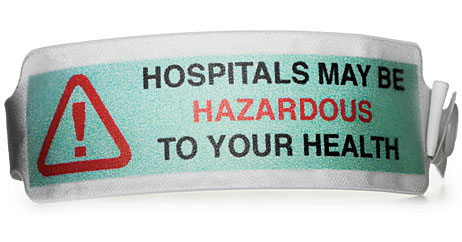
I recently had surgery to relieve an impingement of my left hip. I suffered a complication of the procedure in the hospital where I received the surgery performed follow-up care to treat the complication. As I lay on the table receiving that second treatment I wondered – okay, I mainly wondered “are they really going to stick a needle there?!,” – but I also asked myself “how strange is it that when patients experience complications, hospitals are rewarded with money to perform additional procedures?”
Since 2008, Medicare has been denying payment to hospitals to treatments they provide as a result of preventable complications. For example, when patients are immobilized from illness or disability, they sometimes develop pressure ulcers – their skin breaks down where the weight of their body meets the bed or wheelchair. Pressure ulcers are a big deal. A red spot on a patient’s backside can quickly turn into a sore, then into an ever expanding mass of tissue damage and infection. Christopher Reeve, the actor paralyzed after a horseback riding injury, died from complications of a pressure ulcer.
Pressure ulcers can almost always be avoided by appropriate nursing care. If patients are turned regularly with appropriate bedding and wheelchairs, no single spot will take the brunt of their weight 24 hours a day, and therefore no pressure ulcers will develop. In recognition of the preventability of pressure ulcers, Medicare no longer reimburses hospitals for the services they provide to treat such problems. The same goes for catheter associated urinary tract infections, which I’ve written about before, as well as catheter associated blood stream infections and injurious patient falls.
Medicare’s non-reimbursement strategy makes a great deal of sense. At a minimum, it will save the program money. But will the program have additional benefits? Specifically, now that hospitals are no longer financially rewarded for causing these complications, will this reduce the incidence of these avoidable events? (To read the rest of this article, please visit Forbes.)
